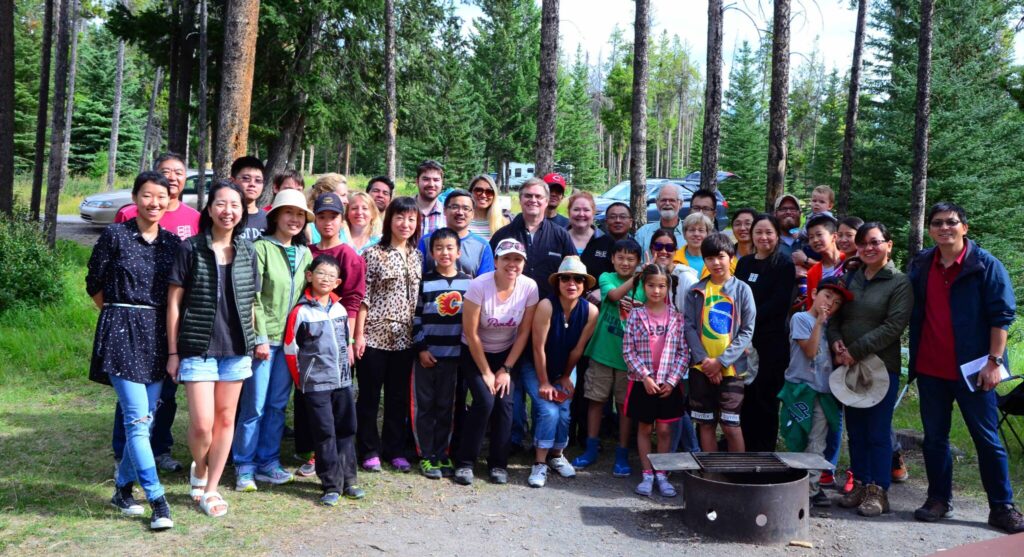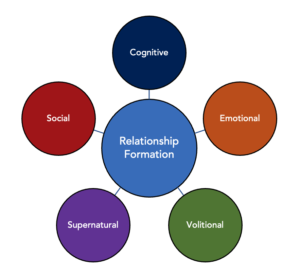Evangelism necessarily involves sharing the Good News through words. However, this Good News must also be lived out through our actions—the “good deeds” that Jesus said would cause people to glorify our Father in heaven (Matt 5:16). This month Rev. Ryan Sim shares one way a local church enacts the gospel in their community.
On a cold October Tuesday morning, the basement of the Community Church in Paris Ontario is a hive of activity, as staff and volunteers arrive for their morning shift at The Raw Carrot. Kristin, the site manager, welcomes everyone to the church’s commercial kitchen, and the team gets to work. One staff member and a volunteer are chopping vegetables while they share their latest news. Another staff member is busy measuring spices and other ingredients, pouring them into gleaming steel pots that he’ll stir and cook all morning.
By the end of the morning, delicious soup is cooling, and the afternoon shift of staff and volunteers arrive to pour it into packages and load the walk-in freezer with products destined for farmers markets, grocery stores, and special events in the area, before the dishwashing and cleanup begin.
Today they’ve made their Signature Carrot and Chicken Noodle soups, but other days they’re making special seasonal soups for monthly subscribers, and batch orders for church events. Other weeks, the team is mixing up granola and pancake mixes, all part of their growing catalogue of products. As they work, staff and volunteers share about their lives, and it’s not uncommon for the group to gather in prayer afterwards.
The work is sometimes slow, inefficient, and not always perfect, but that’s because the values of this caring and inclusive community come first. The Raw Carrot exists to provide meaningful employment and livelihood security to individuals on social assistance who want to, and can, work. Most often these are individuals with a disability or mental illness, who take on permanent, part-time paid jobs in a supportive real-world setting.
The Raw Carrot may operate as a social enterprise from the church basement, but as a ministry of the church it is seamlessly integrated with everything the church does upstairs and in the community. Some staff regularly attend worship, while others prefer the informality of the church’s community dinners, but all can say they have friends and colleagues who are part of Paris Community Church.
The church, part of the Presbyterian Church of Canada, provides a facility and covers some of the operating costs, since around 80% of costs are covered from product sales. It is also the Raw Carrot’s most reliable customer. Newcomers to worship are welcomed with a free bag of pancake mix. Once a month the church hosts a “Mug of Soup” Sunday where Raw Carrot products are served to the congregation after church, and newcomers who join the “meet the senior pastor” table receive a free bowl. Soup was served one evening at the latest Alpha course, and at the latest ministerial meeting for the town’s pastors. Many churches joke that the answer to every children’s story time question is always “Jesus!”, but at Paris Community Church, it’s clear that “soup!” is a close runner-up.
This unique ministry started with Amanda, a teenage nursery volunteer at Paris Community Church with a mild intellectual disability. An adult mentor, Rebecca, was impressed with her diligence, but knew high school graduation would be a hard transition away from community and would likely lead her to few job prospects and little social assistance. She helped her find and attend an employment training agency, but sadly, even after completing that program Amanda didn’t find employment. Rebecca began to realize that several marginalized people in their community, like Amanda, had the potential and desire to work, but barriers prevented them from contributing to most workplaces. Out of this experience, Rebecca and a co-founder created the Raw Carrot just over 10 years ago, and Amanda still works there today.
Upstairs in the church’s office spaces, Rebecca now leads The Raw Carrot “HQ,” a team that supports not only the Paris site Rebecca co-founded, but four other sites across Ontario, and one opening soon in Manitoba. This social franchise has clearly resonated with other churches and non-profits who have a vision for reducing poverty and marginalization.
As the ministry’s presence expands, so does its impact. One staff member from the Raw Carrot’s site in rural Innerkip, Ontario was recently baptized. She says, “I have been working at the Raw Carrot in Innerkip for five years. This has been a rewarding experience on many levels including my spiritual growth. I was fairly new to Christianity when I began working there, so being employed in a Christian-based business was and is very special to me. We start each day with a Bible quote and prayer which allows me to begin my day with the closeness of God. Many of the volunteers have helped me to learn about and draw closer to God. I have also had the opportunity to introduce a coworker to the Church and watch the Spirit grow within several of my coworkers. There is no doubt that God captains the Raw Carrot ship, and I couldn’t be happier.”
Many churches are laudably working to make their worship services and events—the attractional mode of church—more welcoming of and inclusive for those with disabilities who are spiritually ready to attend. This often happens through critical physical accommodations like ramps and accessible washrooms. But for those further afield, facing hunger, poverty, and lack of affordable housing, bigger barriers exist. The Raw Carrot is a way that the Church looks outward, seeking out such marginalized people in our communities, building lasting relationships, and creating dignified employment opportunities in a community that is itself a fresh expression of church.
The Raw Carrot is the missional mode of church. The Fresh Expressions movement defines this mode as a formative journey that starts with serving needs, before building community, then forming disciples, who can ultimately become a church right where they are. Raw Carrot sites may appear to be hosted by churches, but for many staff and volunteers, the Raw Carrot is the very definition of Christian community meeting their most basic needs with dignity and Christian love.
The Raw Carrot is actively expanding, and the organization’s Director of Communications & Public Affairs, Diane Talbot-Schoenhoff, welcomes contact from those interested in starting a site, selling its products, or supporting the ministry in other ways. You can visit them online to learn more: https://therawcarrot.com

 However, when we think about conversion (and evangelism), we tend to emphasize just one area of transformation. In fact, most of our ways of framing what it means to become Christian fall into one of five models of conversion:
However, when we think about conversion (and evangelism), we tend to emphasize just one area of transformation. In fact, most of our ways of framing what it means to become Christian fall into one of five models of conversion: